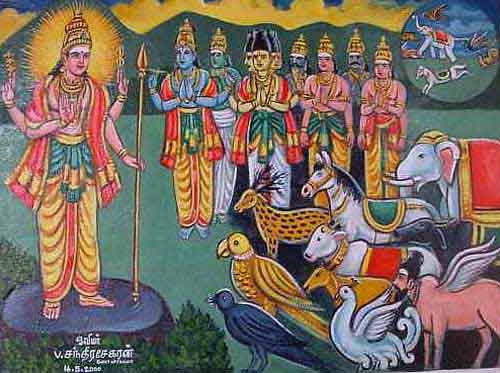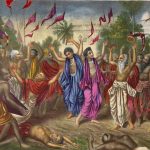Sacred Animals in Hinduism: Their Symbolism and Significance

In Hinduism, animals are much more than just creatures; they are seen as symbols of divine qualities and are often revered for their deep spiritual significance. From sacred cattle to powerful birds, animals play a central role in Hindu beliefs and practices, embodying the qualities of gods and goddesses, and representing spiritual concepts like purity, strength, and wisdom.
The Cow: Symbol of Purity and Non-Violence
The cow holds an especially revered position in Hinduism, symbolizing purity, selfless service, and non-violence (ahimsa). The cow is closely associated with Aditi, the mother of all gods, and is often seen as a symbol of abundance and fertility. Cows are treated with great respect and are considered sacred in Hindu culture, with many Hindus avoiding the consumption of beef. The protection of cows is viewed as a religious duty, and they are often featured in religious rituals and prayers.
The Elephant: Symbol of Wisdom and Strength
The elephant, particularly in the form of Lord Ganesha, the elephant-headed god, is one of the most revered animals in Hinduism. Ganesha is the deity of wisdom, prosperity, and remover of obstacles, and his form as an elephant-headed god represents intelligence, stability, and the ability to overcome challenges. Elephants in general are associated with strength, intelligence, and power, with many temples dedicated to Ganesha featuring sculptures of elephants or rituals involving the animal.
The Monkey: Symbol of Devotion and Loyalty
The monkey, especially in the form of Hanuman, the monkey god, is another important sacred animal in Hinduism. Hanuman represents devotion, strength, loyalty, and selfless service. As a devoted follower of Lord Rama, Hanuman is an embodiment of unshakable faith and dedication. The monkey’s association with Hanuman highlights the virtues of humility, devotion, and courage in Hindu teachings.
The Bull: Nandi and the Symbol of Strength and Loyalty
The bull, represented by Nandi, is a sacred animal in Hinduism, particularly associated with Lord Shiva, one of the principal deities. Nandi is regarded as Shiva’s vehicle (vahana) and is a symbol of strength, loyalty, and devotion. Nandi’s role as Shiva’s companion in many temples underscores the importance of devotion and service to the divine. The image of Nandi can often be seen sitting in front of Shiva temples, symbolizing submission, loyalty, and the power to transcend earthly desires.
The Peacock: Symbol of Beauty and Wisdom
The peacock, a bird associated with the goddess Saraswati, symbolizes beauty, art, wisdom, and knowledge. Saraswati, the goddess of learning, often rides a peacock, and the bird’s vibrant colors are seen as symbols of the brilliance of wisdom and creativity. In Hindu mythology, the peacock’s ability to spread its feathers is viewed as a metaphor for the spreading of knowledge and enlightenment.
The Swan: Symbol of Purity and Discrimination
The swan, or Hamsa, is another revered bird in Hinduism. It is associated with the divine and symbolizes purity, discrimination, and spiritual wisdom. The swan is believed to possess the ability to separate milk from water, symbolizing the ability to discern the truth and wisdom from illusion. In Hindu iconography, gods like Brahma (the creator god) and Saraswati are often depicted with a swan as their vehicle, reinforcing the connection between purity and divine knowledge.
The Serpent: Symbol of Energy and Transformation
In Hinduism, the serpent (or naga) is a symbol of energy, transformation, and rebirth. The serpent is often associated with Shiva, who is depicted with a serpent around his neck. The serpent also symbolizes the power of the Kundalini, a form of spiritual energy believed to reside at the base of the spine. The snake’s ability to shed its skin is symbolic of renewal and spiritual transformation.
The Horse: Symbol of Power and Victory
The horse is a sacred animal in Hindu mythology, particularly associated with the Ashvamedha Yajna, an ancient Vedic ritual that involved a horse being sacrificed to ensure the king’s victory and prosperity. The horse symbolizes power, victory, and courage. In the Mahabharata, the Ashvamedha sacrifice played an important role, and horses were used to symbolize royalty and divine favor.
Conclusion
In Hinduism, animals are not just seen as physical creatures; they are symbolic representations of divine principles and cosmic forces. The reverence for sacred animals like the cow, elephant, monkey, and swan highlights the deep connection between spirituality and nature in Hindu traditions. These animals embody various virtues such as wisdom, purity, devotion, and strength, and they play a central role in the religious, mythological, and cultural practices of Hindus. Reverence for animals in Hinduism serves as a reminder of the interconnectedness of all life, fostering respect, compassion, and reverence for the natural world.










